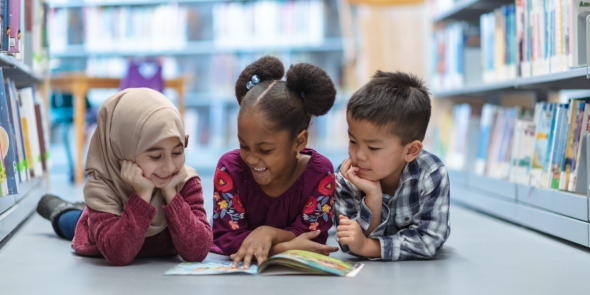
Overview
Kindergarten students in SFUSD engage in 125 minutes of daily literacy instruction. During this time, students engage in a variety of instructional contexts to build foundational skills in reading and writing that provide a strong sense of agency in order to support their identities as readers and writers.
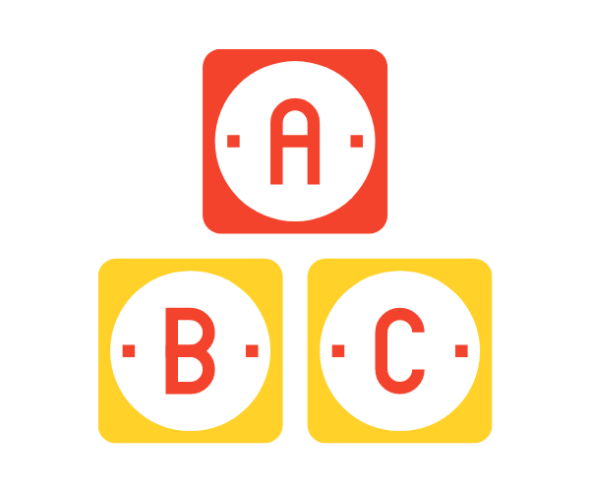
Foundational Skills: Students engage in a 45-minute foundational skills block that includes phonological awareness, explicit phonics instruction, word work, high frequency words, and the application of foundational skills in decodable text. Lots of practice with all these foundational skills are potent steps toward their becoming joyful and competent readers.

Reading & Writing: Using the HMH Into Reading curriculum, students engage in an 80-minute reading and writing block. The reading block includes direct instruction in vocabulary, comprehension strategies, small group differentiation, independent reading, shared reading, and interactive read-aloud. Students also focus on a particular writing mode and form by utilizing the steps of the writing process. They are also exposed to aspects of writer’s craft, using a mentor text. They also have opportunities to integrate instruction for grammar/ conventions in the context of writing instruction.
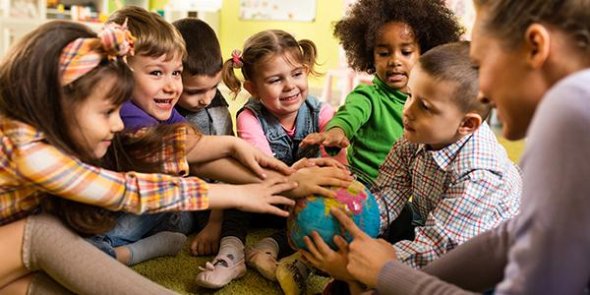
Speaking & Listening: Students' vocabulary and knowledge about themselves and their world grow exponentially through regular opportunities to read, think, talk, and write about rich stories and other read-aloud books.
Overview Link to this section
| English Language Arts | 125 Min Daily |
|---|---|
Foundational Skills Block:
| 45 min |
| Literacy Centers and Small Group Differentiated Reading Instruction | 30 min |
Reading & Vocabulary Block:
| 25 min |
Writing Block
| 25 min |
Priority Standards Link to this section
What students will know, what students will do, and what thinking skills students will develop to apply and transfer English language understandings that endure within the discipline, leverage deeper understandings, and/or support readiness for success at the next grade level.
In Kindergarten focus on these critical areas:
Foundational Skills
- Demonstrate understanding of the organization and basic features of print
- Demonstrate understanding of spoken words, syllables, and sounds (phonemes)
- Know and apply grade-level phonics and word analysis skills in decoding words
- Read emergent-reader texts with purpose and understanding.
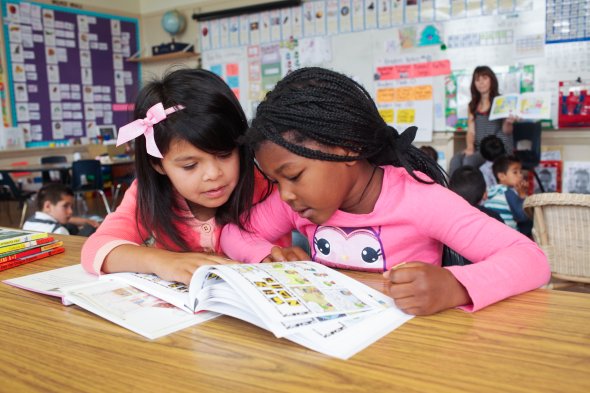
Reading
- With prompting and support ask and answer questions, describe connections, and retell important information and key details from texts
- With prompting and support ask and answer questions about unknown words in a text
- With prompting and support compares and contrast key elements within and across texts.
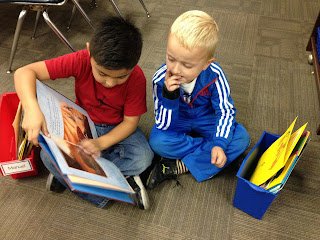
Speaking and Listening
- Participate in daily collaborative, small-group, or partner discussions about anchor texts to process and extend their learning:
- Engage in productive talk through peer partnerships
- Reflect on each other’s thinking using evidence, as well as consider and challenge each others’ perspectives
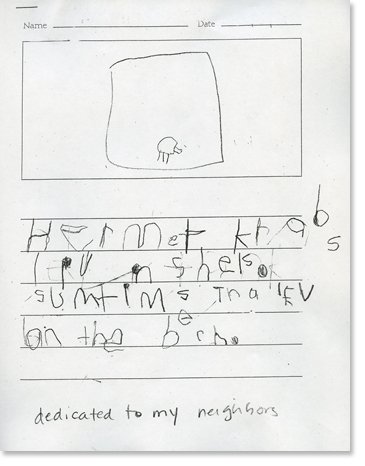
Written Expression
- Share new learnings about topics through the study of anchor texts
- Respond to texts through writing in order to deepen comprehension
- To ensure equal access to the topic they are writing about, write about topics connected to texts they are reading or listening to
- Engage in writing tasks that are connected to literary texts they are reading or listening to in order to promote perspective-taking
- Write stories and personal narratives rooted in social-emotional learning
- Demonstrate command of writing conventions
Instruction: Signature Elements Link to this section
Below are signature elements of SFUSD English Language Arts instruction that students should experience regularly throughout Kindergarten as they develop as English readers, writers, speakers, & listeners.
Foundational Skills Routines
These quick routines provide students with time to review and consolidate their phonological knowledge (letter names, sounds, phonemic awareness, high frequency words, etc.)
Phonics
Phonics instruction is delivered using science-based methods. The methodology includes systematic and explicit instruction aligned with a research-based scope and sequence to provide students with a foundation to become confident, independent readers and writers.
Decodable Texts
Decodable text helps children connect what they are learning in phonics to what they are reading to build a faster foundation in early reading. Children progress at a much faster rate in phonics when the bulk of instructional time is spent on applying the skills to authentic reading and writing experiences, rather than on isolated skill and drill work. At least half of phonics lessons should be devoted to application.
Shared Reading
Shared Reading is a community literacy experience that provides students the opportunity to engage in the reading process together. Students participate in multiple readings of the text as the teacher guides them in text-based discussions and addresses teaching points that focus on letter/sound relationships, word analysis skills, vocabulary, language structure, fluency, and comprehension skills. During Shared Reading, thinking and questioning of students is the focal point. Students build connections to prior learning and experiences through meaningful conversations and collaboration.
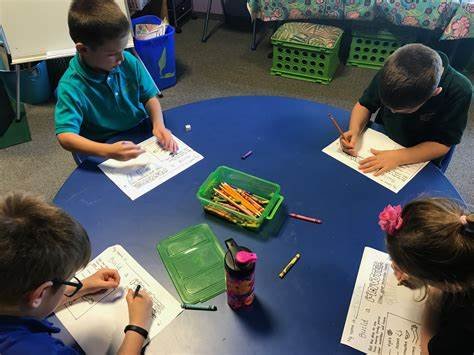
Literacy Centers
Literacy centers provide students with the opportunity to practice previously taught literacy skills or reinforce content area learning. The centers have appropriate materials to enable students to work independently, with partners or in small groups.
Differentiated Small Group Reading Instruction
As the class engages in activities to build independence, the teacher meets with small groups for targeted instruction based on analysis of student data. The teacher gathers 2-4 students with similar strengths and needs and leads them in instruction on foundational skills practice, guided reading, or language development. During the lesson, as students are actively engaged in practicing the skill or strategy, the teacher models, monitors understanding, and provides feedback directly to students. The teacher will often follow up the small group instruction with additional lessons as needed.
The lesson is designed to scaffold the students in applying the skill or strategy in their own independent reading. The lesson structure and teaching methodology is varied based on the level of scaffolding needed. During the lesson, as students are actively engaged in practicing the skill or strategy, the teacher monitors understanding and provides feedback directly to students. The teacher will often follow up the small group instruction with additional lessons as needed.
Reading to Build Knowledge & Vocabulary
Class communities gather daily to build knowledge in content-rich, grade-level complex texts. Teachers guide students using text-dependent questions and facilitate engaging conversations and written responses that promote evidence-based deeper thinking. There is also direct instruction in vocabulary connected to the knowledge building topics. This block may include a variety of instructional contexts, including minilessons, interactive read-aloud, close/shared reading, academic conversations, and shared writing about text, and applying vocabulary strategies.
Writing Block
During the writing block, students are engaged in creating writing pieces from the Common Core State Standards that follow the writing process. This writing block includes lessons that provide direct, explicit instruction and guided practice in skills and strategies connected to the genre. Afterward, students apply learning to writing in partnerships and individually. There are multiple opportunities for students to share their writing in addition to providing and receiving feedback.
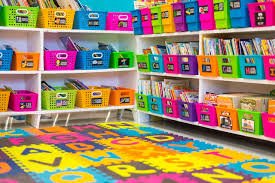
Classroom Libraries to Support Independent Reading
Kindergarten classroom libraries provide student access to a range of text types including leveled books, decodable text, informational text, and literature. Libraries should also include culturally relevant texts that represent diverse language and cultures. Leveled books support students' early reading behaviors and print concepts as well as give readers access to reading increasingly complex text. Decodable books reinforce phonics and decoding skills explicitly taught during the foundational skills block.
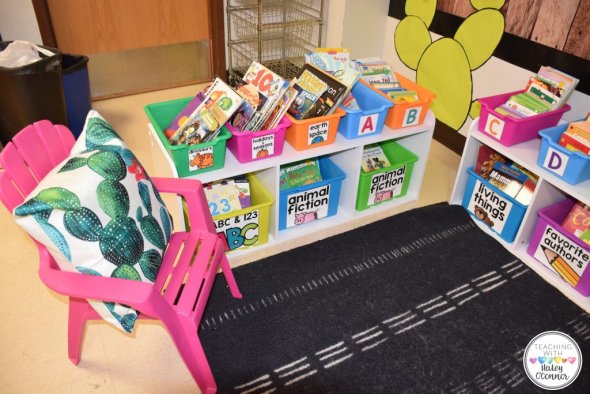
Informational text and literature provide students access to familiar and/or high-interest books that have been read aloud to students, are connected to content area instruction, or just fun to read. The classroom library should be an inviting space with labeled bins organized by interest, theme, content, level, or phonics skill. The organization of the library should support student engagement and interest along with ease of choice and maintenance.
Materials
Below are items you should have to support your students' ELA instruction. If you are missing anything from the list, please first contact your site administrator or designated support. If they are unable to resolve the issue promptly, please contact abdelhamidr@sfusd.edu from the SFUSD Elementary ELA Team Team.
HMH Into Reading Physical Resources
- Teacher’s Guides
- Student Materials
HMH Online Resources are available in Clever after August 15. If you do not have access, fill out this form to receive access.
Modules & Suggested Pacing
Reflection Questions Link to this section
- How are students' developmental needs, communities, and experiences being reflected and honored, or how could they be?
- What opportunities do you see for developing equitable access & demand, inquiry, collaboration, and assessment for learning?
- What are the implications for your own practice? What strengths can you build upon? What will you do first?
Want More?
Standards
http://www.thecorestandards.org/ELA-Literacy/
ELA SFUSD Website: https://sites.google.com/sfusd.edu/elak-5
Contact the English Language Arts Team:
This page was last updated on August 21, 2024

